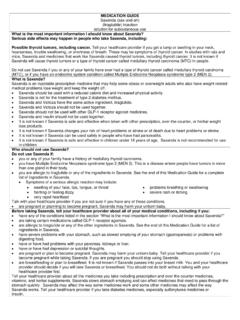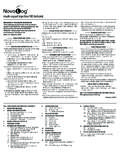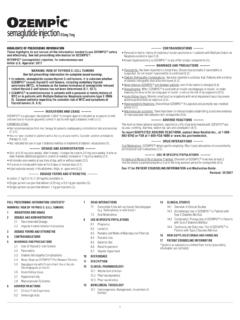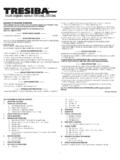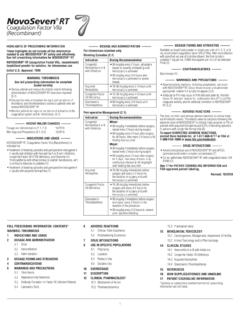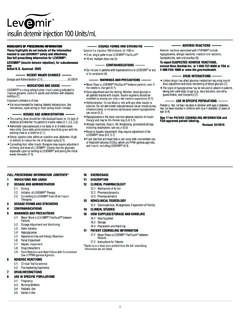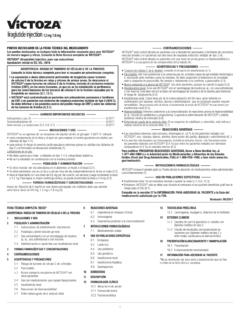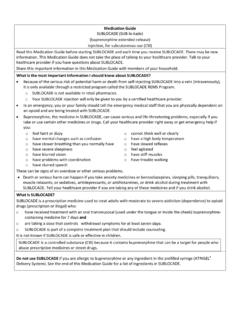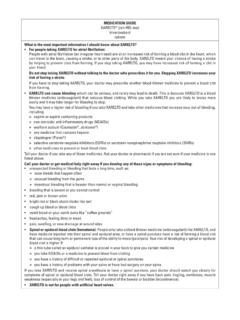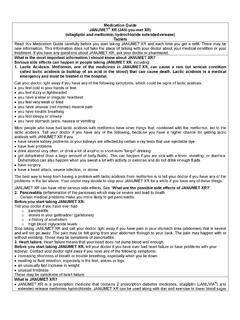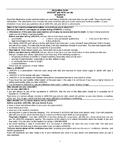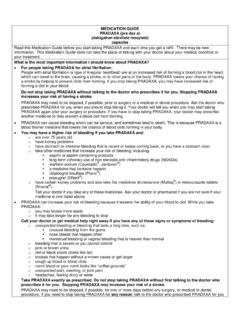Transcription of HIGHLIGHTS OF PRESCRIBING INFORMATION ...
1 1 CONTRAINDICATIONS victoza is contraindicated in patients with a personal or family history of medullary thyroid carcinoma or in patients with Multiple Endocrine Neoplasia syndrome type 2 (4). victoza is contraindicated in patients with a prior serious hypersensitivity reaction to victoza or any of the product components (4). WARNINGS AND PRECAUTIONS Thyroid C-cell Tumors: See Boxed Warning ( ). Pancreatitis: Postmarketing reports, including fatal and non-fatal hemorrhagic or necrotizing pancreatitis. Discontinue promptly if pancreatitis is suspected. Do not restart if pancreatitis is confirmed ( ). Never share a victoza pen between patients, even if the needle is changed ( ). Serious Hypoglycemia: When victoza is used with an insulin secretagogue ( a sulfonylurea) or insulin, consider lowering the dose of the insulin secretagogue or insulin to reduce the risk of hypoglycemia ( ).
2 Renal Impairment: Postmarketing, usually in association with nausea, vomiting, diarrhea, or dehydration which may sometimes require hemodialysis. Use caution when initiating or escalating doses of victoza in patients with renal impairment ( ). Hypersensitivity: Postmarketing reports of serious hypersensitivity reactions ( , anaphylactic reactions and angioedema). Discontinue victoza and promptly seek medical advice ( ). Acute Gallbladder Disease: If cholelithiasis or cholecystitis are suspected, gallbladder studies are indicated ( ) ADVERSE REACTIONS The most common adverse reactions, reported in 5% of patients treated with victoza are: nausea, diarrhea, vomiting, decreased appetite, dyspepsia, constipation ( ). Immunogenicity-related events, including urticaria, were more common among victoza -treated patients ( ) than among comparator-treated patients ( ) in clinical trials ( ).
3 To report SUSPECTED ADVERSE REACTIONS, contact Novo Nordisk Inc. at 1 877 484 2869 or FDA at 1 800 FDA 1088 or DRUG INTERACTIONS victoza delays gastric emptying. May impact absorption of concomitantly administered oral medications. (7). USE IN SPECIFIC POPULATIONS Renal Impairment: No dose adjustment recommended ( , , ). Pregnancy: victoza should be used during pregnancy only if the potential benefit justifies the potential risk to the fetus ( ).See 17 for PATIENT COUNSELING INFORMATION and FDA-Approved Medication : 08/2017 FULL PRESCRIBING INFORMATION : CONTENTS*WARNING: RISK OF THYROID C CELL TUMORS1 INDICATIONS AND USAGE2 DOSAGE AND ADMINISTRATION Important Administration Instructions General Dosing and Administration Concomitant Use with an Insulin Secretagogue ( Sulfonylurea)
4 Or with Insulin Dosage in Patients with Renal Impairment3 DOSAGE FORMS AND STRENGTHS4 CONTRAINDICATIONS5 WARNINGS AND PRECAUTIONS Risk of Thyroid C-cell Tumors Pancreatitis Never Share a victoza Pen Between Patients Use with Medications Known to Cause Hypoglycemia Renal Impairment Hypersensitivity Reactions Acute Gallbladder Disease6 ADVERSE REACTIONS Clinical Trials Experience Immunogenicity Post-Marketing Experience7 DRUG INTERACTIONS Oral Medications8 USE IN SPECIFIC POPULATIONS Pregnancy Lactation Pediatric Use Geriatric Use Renal Impairment Hepatic Impairment Gastroparesis10 OVERDOSAGE11 DESCRIPTION12 CLINICAL PHARMACOLOGY Mechanism of Action Pharmacodynamics Pharmacokinetics13 NONCLINICAL TOXICOLOGY Carcinogenesis, Mutagenesis, Impairment of Fertility14 CLINICAL STUDIES Glycemic Control Trials in Adults with Type 2 Diabetes Mellitus Cardiovascular Outcomes Trial in Patients with Type 2 Diabetes Mellitus and Atherosclerotic Cardiovascular Disease16 HOW SUPPLIED/STORAGE AND HANDLING How Supplied Recommended Storage17 PATIENT COUNSELING INFORMATION *Sections or subsections omitted from the full PRESCRIBING INFORMATION are not OF PRESCRIBING INFORMATIONT hese HIGHLIGHTS do not include all the INFORMATION needed to use victoza safely and effectively.
5 See full PRESCRIBING INFORMATION for victoza . victoza (liraglutide) injection, for subcutaneous use Initial Approval: 2010 WARNING: RISK OF THYROID C CELL TUMORSSee full PRESCRIBING INFORMATION for complete boxed warning. Liraglutide causes thyroid C-cell tumors at clinically relevant exposures in both genders of rats and mice. It is unknown whether victoza causes thyroid C-cell tumors, including medullary thyroid carcinoma (MTC), in humans, as the human relevance of liraglutide-induced rodent thyroid C-cell tumors has not been determined ( , ). victoza is contraindicated in patients with a personal or family history of MTC or in patients with Multiple Endocrine Neoplasia syndrome type 2 (MEN 2). Counsel patients regarding the potential risk of MTC and the symptoms of thyroid tumors (4, ).
6 RECENT MAJOR CHANGES Indications and Usage (1) ---------------------------------------- -------------------------- 8/2017 Contraindications (4) ---------------------------------------- ------------------------------- 8/2017 Warnings and Precautions ( , , ) ---------------------------------------- ---------- 8/2017 INDICATIONS AND USAGE victoza is a glucagon like peptide 1 (GLP 1) receptor agonist indicated: as an adjunct to diet and exercise to improve glycemic control in adults with type 2 diabetes mellitus (1). to reduce the risk of major adverse cardiovascular events in adults with type 2 diabetes mellitus and established cardiovascular disease (1).Limitations of Use: Not for treatment of type 1 diabetes mellitus or diabetic ketoacidosis.
7 Has not been studied in combination with prandial insulin. DOSAGE AND ADMINISTRATION Inject subcutaneously in the abdomen, thigh or upper arm ( ). Administer once daily at any time of day, independently of meals ( ). Initiate at mg per day for one week then increase to mg. Dose can be increased to mg for additional glycemic control ( ). DOSAGE FORMS AND STRENGTHS Injection: 6 mg/mL solution in a pre-filled, multi-dose pen that delivers doses of mg, mg, or mg (3). victoza (liraglutide) injection, for subcutaneous use2 FULL PRESCRIBING INFORMATIONWARNING: RISK OF THYROID C CELL TUMORS Liraglutide causes dose-dependent and treatment-duration-dependent thyroid C-cell tumors at clinically relevant exposures in both genders of rats and mice.
8 It is unknown whether victoza causes thyroid C-cell tumors, including medullary thyroid carcinoma (MTC), in humans, as the human relevance of liraglutide-induced rodent thyroid C-cell tumors has not been determined [see Warnings and Precautions ( ) and Nonclinical Toxicology ( )]. victoza is contraindicated in patients with a personal or family history of MTC and in patients with Multiple Endocrine Neoplasia syndrome type 2 (MEN 2). Counsel patients regarding the potential risk for MTC with the use of victoza and inform them of symptoms of thyroid tumors ( a mass in the neck, dysphagia, dyspnea, persistent hoarseness). Routine monitoring of serum calcitonin or using thyroid ultrasound is of uncertain value for early detection of MTC in patients treated with victoza [see Contraindications (4) and Warnings and Precautions ( )].
9 1 INDICATIONS AND USAGE victoza is indicated: as an adjunct to diet and exercise to improve glycemic control in adults with type 2 diabetes mellitus, to reduce the risk of major adverse cardiovascular events (cardiovascular death, non-fatal myocardial infarction, or non-fatal stroke) in adults with type 2 diabetes mellitus and established cardiovascular disease [see Clinical Studies ( )].Limitations of Use: victoza is not a substitute for insulin. victoza should not be used in patients with type 1 diabetes mellitus or for the treatment of diabetic ketoacidosis, as it would not be effective in these settings. The concurrent use of victoza and prandial insulin has not been DOSAGE AND Important Administration Instructions Inspect visually prior to each injection.
10 Only use if solution is clear, colorless, and contains no particles. Inject victoza subcutaneously in the abdomen, thigh or upper arm. No dose adjustment is needed if changing the injection site and/or timing. When using victoza with insulin, administer as separate injections. Never mix. It is acceptable to inject victoza and insulin in the same body region but the injections should not be adjacent to each General Dosing and Administration Inject victoza subcutaneously once-daily at any time of day, independently of meals. Initiate victoza with a dose of mg per day for one week. The mg dose is a starting dose intended to reduce gastrointestinal symptoms during initial titration, and is not effective for glycemic control. After one week at mg per day, the dose should be increased to mg.
